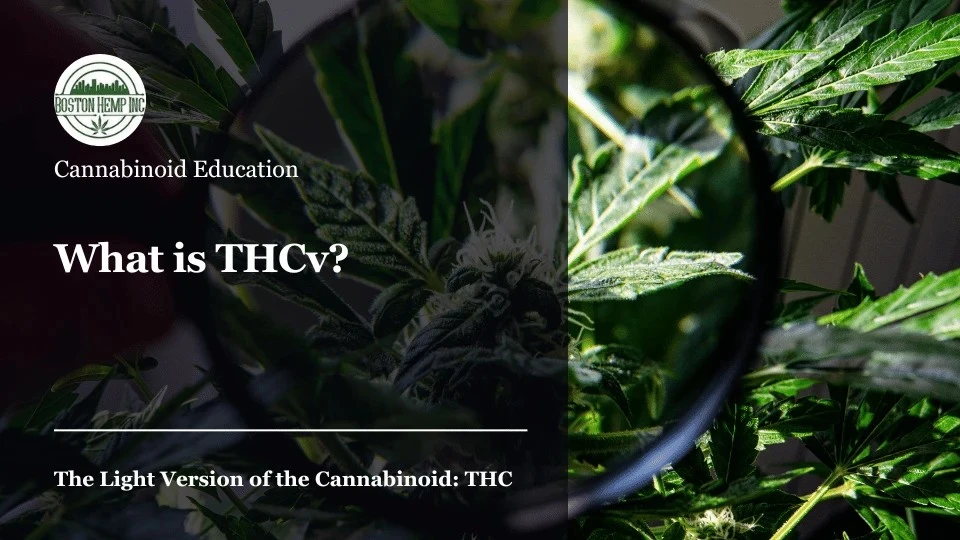THCv is considered the light version of THC, the psychoactive cannabinoid.
This article delves into what exactly this compound is. It also covers many of the most common questions about it.
For a deeper dive into ALL of the different types of THC cannabinoids check out this extensive article here.
What is the THCv Cannabinoid found in Cannabis?
THCv is a plant cannabinoid found in the cannabis or hemp plant. It is a minor cannabinoid, meaning that it is found in lower concentrations compared to THC or CBD.
THCv is known for its potential therapeutic effects. It can suppress appetite, reduce inflammation, and provide neuroprotective properties.
Research on THCv is still in its early stages, but it shows promise for various medical applications.
Some cannabis strains have been bred to have higher levels of THCv. This allows for more targeted use of this compound for specific therapeutic benefits.
Why Listen to Boston Hemp Inc.?
We have over 5 years of firsthand experience crafting and designing dozens of cannabinoid-based products.
We have also worked with these plants and THCv products.
As a result, we are positioned to bring top-notch education about all the different types of hemp and cannabis products.
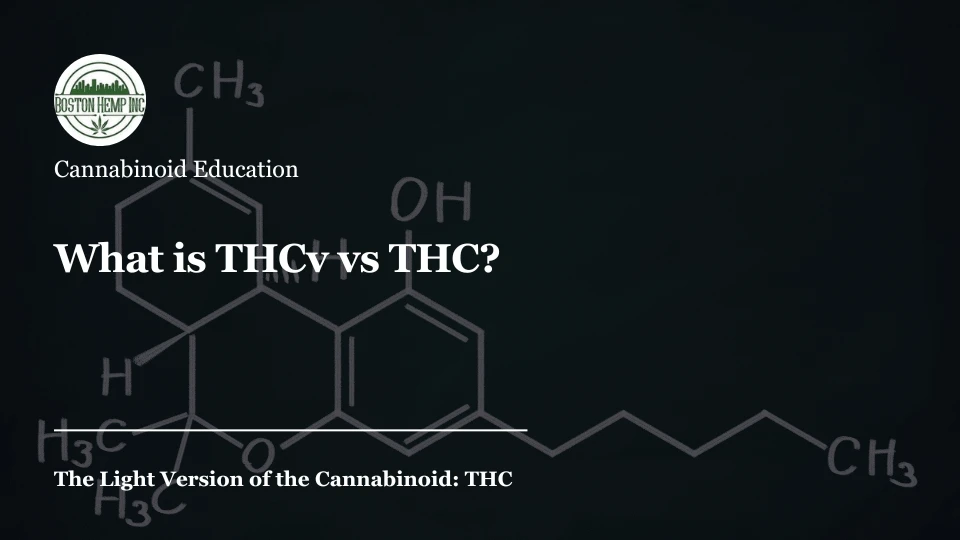
What is THCv vs THC?
THCv (Tetrahydrocannabivarin) and THC (Tetrahydrocannabinol) are both natural compounds found in cannabis, but they have some key differences.
THC is the main psychoactive part of cannabis, which means it’s what makes people feel “high.”
It’s also used for various supposed medical benefits. It’s said to ease pain and increase appetite.
On the other hand, THCv is one of many rare cannabinoids, is less well known, and doesn’t make you feel as high.
It might even lessen the psychoactive effects of THC when taken together.
Interestingly, THCv is being studied for its potential to help with weight loss because it might reduce appetite.
So, while they come from the same plant, THC and THCv have their unique effects and potential uses!
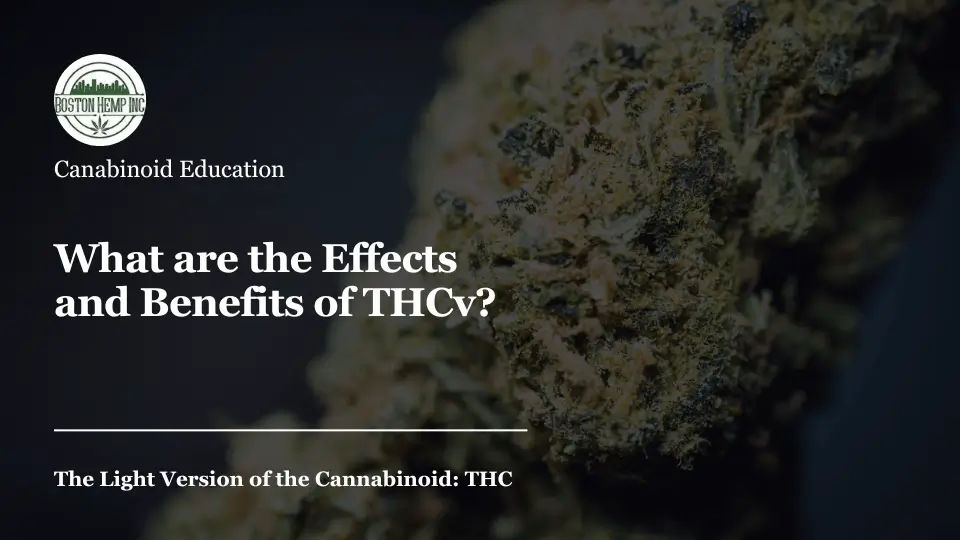
What are the Effects and Benefits of THCv?
THCv is a fascinating cannabinoid that’s been garnering attention for its unique effects and potential benefits.
While it’s similar to THC, the most famous cannabinoid, THCv has its distinct properties.
Potential Side Effects of THCv Plant Cannabinoid:
Reduced Psychoactivity:
THCv is less psychoactive compared to THC.
In smaller doses, it can even counteract some of the psychoactive effects of THC.
This means it might help reduce the feeling of being “high” and could potentially ease anxiety or paranoia sometimes associated with cannabis use.
Appetite Suppression:
Unlike THC, which can increase appetite, THC-v is known to suppress it.
This makes THC-v a point of interest for weight management and possibly for conditions that benefit from appetite control.
Potential Benefits of taking THC-v:
Diabetes and Obesity:
Early research suggests that THCv may help regulate blood sugar levels and reduce insulin resistance. This makes it a potential ally in the fight against diabetes and obesity.
Neuroprotective Properties:
THCv is being studied for its neuroprotective effects. It might help with conditions like Parkinson’s disease by protecting brain cells and reducing tremors and motor control issues.
Bone Growth and THC-v
There’s also some evidence to suggest that THCv may promote bone growth, which could be beneficial in treating conditions like osteoporosis.
While the research on THC-v is still in the early stages, its unique effects and potential benefits make it an exciting area of study.
As with all cannabinoids, the effects can vary from person to person. So, it’s important to approach use thoughtfully and consider personal health and context.
As always, if you’re considering using THC-v for therapeutic purposes, consult with a healthcare professional. Understand how it might fit into your health regimen.

What does THCv do to the body?
THC-v has distinct properties and effects on the body.
It interacts with the endocannabinoid system (ECS), which regulates physiological processes.
Appetite Suppression:
Unlike THC, which is known to increase appetite, THCV may act as an appetite suppressant.
It’s thought to block the CB1 receptors in the brain, which are involved in controlling hunger and food intake.
This makes it a subject of interest for weight loss and the management of obesity.
Psychoactive Effects of THCv:
At low doses, THC-V doesn’t appear to produce psychoactive effects.
However, at higher doses, it can produce psychoactive effects that are generally described as clear-headed and stimulating.
This is because it can act both as an antagonist and an agonist at the CB1 and CB2 receptors, respectively, depending on the dose.
Blood Sugar Regulation:
Preliminary research suggests that THCV might help regulate blood sugar levels and reduce insulin resistance.
This could benefit people with diabetes.
However, more research is needed to fully understand these effects and their clinical applications.
Reduced Panic Attacks and Anxiety:
THCV has shown potential in animal studies for reducing panic attacks and anxiety. It does so without suppressing emotions. Its ability to block the CB1 receptors might be responsible for these anti-anxiety effects.
THCv and Bone Growth:
THCV is believed to promote the growth of new bone cells, which is promising for osteoporosis and other related conditions.
It might work by interacting with CB2 receptors, which are part of the ECS and found in the bones.
Neuroprotective Properties of THCv:
Some studies suggest that THCV has neuroprotective properties.
It might help protect brain cells against damage, inflammation, and oxidative stress.
Researchers are studying its potential to treat conditions like Parkinson’s disease.
It’s important to note that while these effects are promising, many are based on early-stage research, including animal studies and small human trials.
More comprehensive clinical trials are needed to fully understand the effects of THCV and how it can be used therapeutically.
Additionally, the way THCV affects an individual can vary.
Factors like the dose, the individual’s unique biology, and the presence of other cannabinoids can influence its effects.
As with any cannabinoid, it’s crucial to approach use thoughtfully and be aware of the legal and health implications.
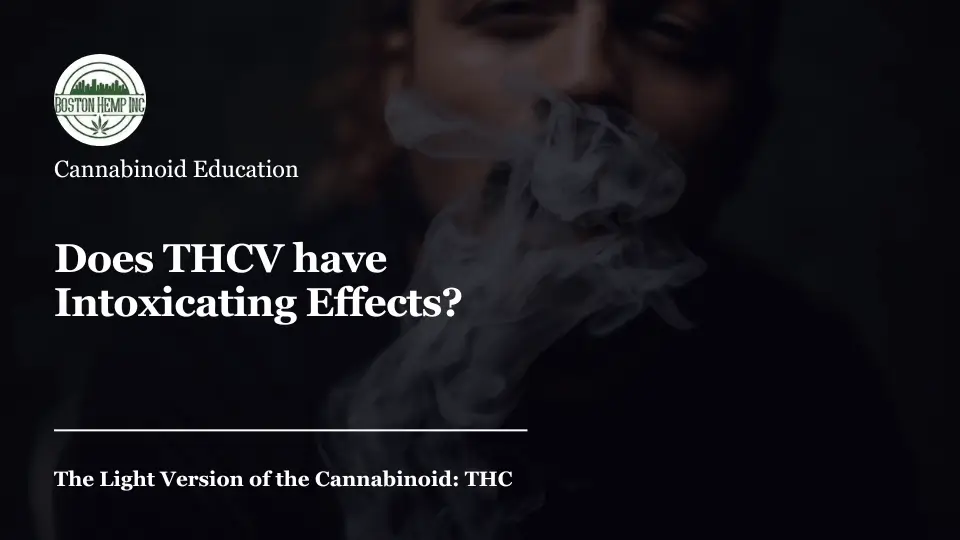
Does THCV have Intoxicating Effects?
THCV (Tetrahydrocannabivarin) has a unique relationship with intoxication.
At lower doses, THC-v is generally not intoxicating and doesn’t produce the “high” that is commonly associated with THC (Tetrahydrocannabinol).
In fact, THCv can act as a CB1 receptor antagonist, which means it may block or diminish some of the psychoactive effects of THC.
This can potentially reduce feelings of anxiety and paranoia that some individuals experience with cannabis products high in THC.
However, at higher doses, THCv may act as a CB1 receptor agonist, similar to THC, leading to psychoactive effects.
These effects are typically described as clear-headed and stimulating, but they are generally less intense and of shorter duration than the effects produced by THC.
This dual action is unique among cannabinoids and makes THC-V a compound of interest for both recreational and medicinal purposes.
The exact dose at which THCV becomes intoxicating can vary widely among individuals due to factors like personal tolerance, the method of consumption, and the presence of other cannabinoids.
Because of this variability and the fact that THCV is less common and less studied than THC, it’s important to approach its use cautiously. This is especially true if you are unfamiliar with its effects or if it’s present in high concentrations in a cannabis product.
The intoxicating potential of THCv may be lower or different than that of THC, but any use of cannabis-derived compounds should be done responsibly. People should also be aware of the legal and health implications.
Always consult with a healthcare professional if you have questions or concerns about using products containing THCV or any other cannabinoids.
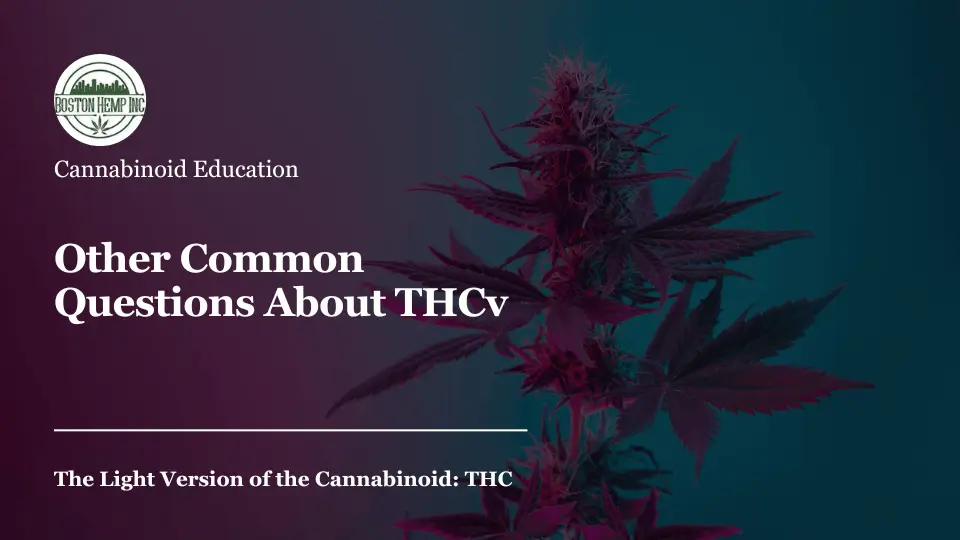
Other Common Questions About THCv
Does THCV help with anxiety?
THCV has shown potential to help with anxiety, particularly by reducing panic attacks without dampening emotion, due to its ability to block CB1 receptors.
However, more research is needed to fully understand its effects and potential therapeutic applications.
Is CBD the same as THCV?
No, CBD (Cannabidiol) and THCV (Tetrahydrocannabivarin) are different compounds found in the cannabis plant.
CBD is non-psychoactive and known for its potential therapeutic benefits, such as reducing anxiety and pain.
THCV is less common. It can have both non-psychoactive and psychoactive effects at different doses. It can potentially suppress appetite and regulate blood sugar.
They interact with the body’s endocannabinoid system in distinct ways.
How to use THCv Products?
Using THCV (Tetrahydrocannabivarin) should be approached with care and consideration of its unique properties and effects.
Here’s a general guide on how to use THCV:
Consult a Healthcare Professional:
Before starting any new supplement or cannabis product, especially one containing cannabinoids like THC-V, it’s important to consult with a healthcare professional.
They can provide personalized advice based on your health history and needs.
Identify Your Needs:
Understand what you’re hoping to achieve with THC-V. Are you interested in its potential for appetite suppression?
Its energy-boosting effects? Or its possible neuroprotective properties?
Knowing your goals can help you choose the right product and dosage.
Find Quality Products:
Look for high-quality, lab-tested cannabis products that specifically list the amounts of THCV.
Products may vary in terms of THCv concentration and the presence of other cannabinoids, which can influence effects.
Start with a Low Dose:
The effects of THCV can vary greatly depending on the dose and individual response. Start with a low dose to understand how it affects you.
You can gradually increase the dose if needed while monitoring your body’s response.
Choose Your Method:
THCV can be consumed in various forms, including oils, tinctures, edibles, and vaporized products.
The method of consumption will affect the onset and duration of effects.
Inhalation offers a quicker onset but shorter duration, while edibles take longer to kick in but last longer.
Monitor Effects and Adjust:
Pay attention to how your body responds to THCV.
If you’re using it for a specific condition like anxiety or weight control, note any changes and adjust your usage accordingly.
Stay Informed:
Research on THCV is ongoing, and new findings are released regularly. Stay informed about the latest research and legal status in your area.
Use Responsibly:
Be mindful of the legal status of cannabis and cannabis-derived products in your location.
Also, consider potential side effects and interactions with other medications.
Remember, while THCV has potential benefits, it’s not a substitute for professional medical advice or treatment.
Always prioritize safety and legality when considering the use of any cannabis product.
Is THCv worth it?
Whether THCV (Tetrahydrocannabivarin) is “worth it” depends on your individual needs, health conditions, and the outcomes you’re seeking.
Here are some factors to consider when evaluating the potential value of THCV:
Potential Benefits:
THCV has been studied for its potential to suppress appetite, regulate blood sugar, reduce anxiety, and provide neuroprotective effects.
If you’re interested in these specific benefits, THCV might be worth considering.
Personal Sensitivity and Reaction:
People react differently to cannabinoids. Some may find THC-V’s effects beneficial and noticeable, while others might not experience significant changes.
Understanding your body’s reaction is key.
Legal and Safety Considerations:
Ensure that THCV and cannabis products are legal in your area. Also, consider any possible side effects or interactions with other medications you might be taking.
Cost and Accessibility:
THCV products can vary in price and availability.
Evaluate whether the cost is justifiable for you, and if you have access to quality, lab-tested products.
Research and Evidence:
While there is promising research, much of it is preliminary. More comprehensive studies are needed to fully understand THCV’s effects, benefits, and potential risks.
Healthcare Guidance:
Consulting with a healthcare provider familiar with cannabis can provide personalized advice and help you weigh the potential benefits against the risks.
Ultimately, determining if THCV is “worth it” is a personal decision. You should base it on careful consideration of the factors above, your health goals, and professional advice.
Is THCv Legal?
The legality of THCV (Tetrahydrocannabivarin) largely depends on its source and the legal status of cannabis in your jurisdiction. Here are the main factors that influence THCV legality:
The sources of THC-V:
THCv From Marijuana:
If THCV is derived from marijuana (cannabis with high THC content), it’s generally illegal in jurisdictions where marijuana is illegal. In places where marijuana is legal for medical or recreational use, THCV derived from it would typically also be legal.
THCv From Hemp:
If THCV is derived from hemp (cannabis with less than 0.3% THC by dry weight), it’s more likely to be legal in places that have legalized hemp and its derivatives under the 2018 Farm Bill in the United States. However, specific regulations can vary.
Local and Federal Laws:
Cannabis laws vary greatly around the world and even within countries, such as between states in the U.S.
Some places have fully legalized cannabis, some have decriminalized it, some allow it only for medical use, and others have strict prohibitions.
Concentration and Product Type:
The legality might also depend on the concentration of THCV in the product. It could also depend on the type of product it is, such as oil, edible, or flower.
Some jurisdictions have specific regulations about the types of cannabis products that are legal.
Recent Legal Changes:
The legal landscape on cannabis and its compounds is ever-evolving. What might be illegal today could change with new legislation.
To determine the current legality of THCV in your area:
Research Local Laws:
Look up the most recent cannabis laws in your jurisdiction.
Consult Legal Experts:
For the most accurate and personalized information, consider consulting a legal expert familiar with cannabis laws in your area.
Remember, even if THCV is legal in your area, there may be restrictions on how it can be bought, sold, or consumed.
Not following these laws can lead to serious legal consequences. Always stay informed and compliant with your local regulations.
What products contain the most THCv?
Products with high levels of THCV are typically derived from specific strains of cannabis that naturally produce more of this cannabinoid.
Here are some common types of products you might find with higher THC-V content:
Strains of Cannabis:
Certain strains are known for their higher THC-V content.
African Sativa strains, like Durban Poison, Doug’s Varin, and Red Congolese, are often cited for having higher levels of THCV.
However, the exact content can vary based on cultivation practices and environmental factors.
Oils and Tinctures:
These concentrated forms can be specifically formulated to contain higher levels of THC-V.
They often come from extracts of strains that are naturally higher in this cannabinoid.
Vape Products:
Similar to oils and tinctures, vape cartridges can be made with THCV-rich cannabis extracts.
Vaping allows for a quick onset of effects, which is something many people seeking the benefits of THCV may desire.
Edibles and Capsules:
Some manufacturers might produce edibles or capsules with higher THC-V content. They do this for their potential effects like appetite suppression or energy.
Isolates and Distillates:
These are highly concentrated forms of cannabinoids.
THC-V isolate is a pure form, and distillates can be crafted to have high levels of THCV.
These products can be used to make other THCV-rich products or consumed directly.
The availability of these products can vary greatly depending on the legal status of cannabis and specific cannabinoids like THCV in your region. It’s important to note.
In places where cannabis is legal, you might find products labeled with their cannabinoid content, including THCV. You can find these products at dispensaries or from licensed retailers.
When looking for products high in THCV, it’s crucial to:
Check Lab Reports:
Reliable manufacturers should provide third-party lab reports verifying the cannabinoid content, including THCV.
Ask for Recommendations:
If you’re in a legal market, ask dispensary staff or a cannabis clinician for advice on THCV-rich products.
Start Slowly:
If you’re new to THCV, start with a low dose to understand how it affects you, as its effects can vary significantly from person to person.
Always ensure you’re purchasing from reputable sources to avoid products with inaccurate labeling or contaminants.
Where can I find THCv?
Several of our products on Boston Hemp Inc contain THCv, find the perfect product for you in our shop here.

